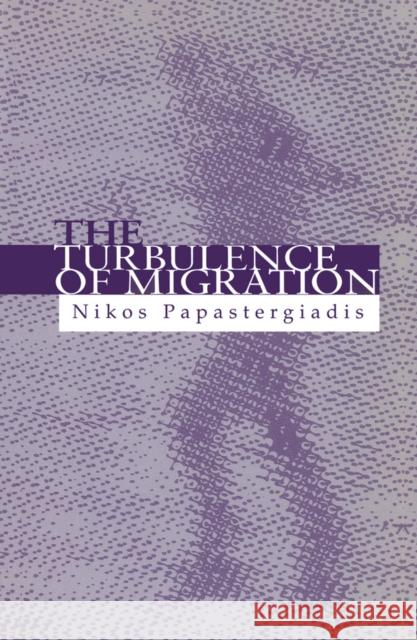The Turbulence of Migration: Globalization, Deterritorialization and Hybridity » książka



The Turbulence of Migration: Globalization, Deterritorialization and Hybridity
ISBN-13: 9780745614311 / Angielski / Miękka / 2000 / 256 str.
The Turbulence of Migration: Globalization, Deterritorialization and Hybridity
ISBN-13: 9780745614311 / Angielski / Miękka / 2000 / 256 str.
(netto: 136,84 VAT: 5%)
Najniższa cena z 30 dni: 103,49
ok. 16-18 dni roboczych.
Darmowa dostawa!
This important book traces the impact of the movement of people, ideas and capital across the globe.
Wydanie ilustrowane
′The Turbulence of Migration is an exciting and comprehensive rendition of the role and impact of migration in contemporary societies. Drawing on a range of theories and disciplines, it unpacks existing accounts of migration processes and suggests new ways of looking at the range of phenomena that make up the "endless motion" of migration that shapes our everyday experiences. Nikos Papastergiadis reveals himself to be one of the most important scholars in this field.′
John Solomos, South Bank University, London
′This volume is important for two reasons. First, it challenges the social sciences to adopt a more functional and dynamic view of culture and the "social" such that difference and culture are incorporated outside of traditional bounded unit classifications. Second, the author has presented a coherent argument for understanding migration as a process that stems from global turbulence in politics, economics and social relations. This volume would make an excellent addition to upper–year undergraduate and gradute papers in disciplines such as sociology, anthropology and geography.′ David Timothy Duval, Sociological Research Online
′The volume′s greatest strength is its review and critique of cultural theorists ... It is a provocative volume that attempts to shift the paradigms through which traditional social science views migration by introducing new strands of scholarship.′ International Migration
′Papastergiadis spells out the consequences for multiculturalist policy and theory ... [His] intentions are grand: to revolutionize migration theory and to place post–colonial theory at the heart of a new social science of modernity.′ Race and Class
′Impressive in its multidiscipinary scope, this book draws together a wide range of work and makes revealing juxtapositions between different fields.′ Progress in Human Geography
′The Turbulence of Migration is an impressive tour de force ... an exceptionally valuable book for those who want a sophisticated, intelligent and critical primer in postmodern theories of globalization, migration and cultural interaction.′ The UTS Review
1. Introduction: The Turbulence of Migration.
2. Mapping Global Migration.
3. The Ability to Move: Defining Migrants.
4. Globalization and Migration.
5. The Deterritorialization of Culture.
6. The Limits of Cultural Translation.
7. Philosophical Frameworks and the Politics of Cultural Difference.
8. Tracing Hybridity in Theory.
9. Conclusion: Clusters in the Diaspora.
Notes.
Bibliography.
Index.
Nikos Papastergiadis is Simon Fellow, University of Manchester.
This important book traces the impact of the movement of people, ideas and capital across the globe. The identity and experience of the migrant have changed dramatically through history, from the forced migration of slaves under colonialism and the displacement of the peasantry during industrialization to the recent victims of ethnic cleansing. Today there are more people on the move, their destination more uncertain and their journeys more complex than ever before. This book provides a clear mapping of earlier patterns of global migration and presents an account of new ′chaotic′ forms of movement around the world.
The mobility that is a key feature of contemporary life has led to fundamental changes in our understanding of culture, identity and community. Drawing on a wide range of debates in sociology, anthropology, geography, political economy and cultural studies, Papastergiadis outlines current trends in cultural analysis, re–examines the relationship between the stranger and migrant, and offers a critique of globalization. The work of key theorists such as Stuart Hall, Gayatri Spivak, Homi Bhabha, Nestor Garcia Canclini, Stephen Castles and Arjun Appadurai is situated in the broad theoretical debates on identity and modern culture. The author discusses the latest theoretical concepts of deterritorialization and hybridity to suggest a new vocabulary and an alternative framework for understanding the relationship between cultural difference and modernity.
This book will be of interest to advanced second–year undergraduate students and above in sociology, philosophy, cultural studies, geography and anthropology, especially those interested in migration.
1997-2026 DolnySlask.com Agencja Internetowa
KrainaKsiazek.PL - Księgarnia Internetowa









